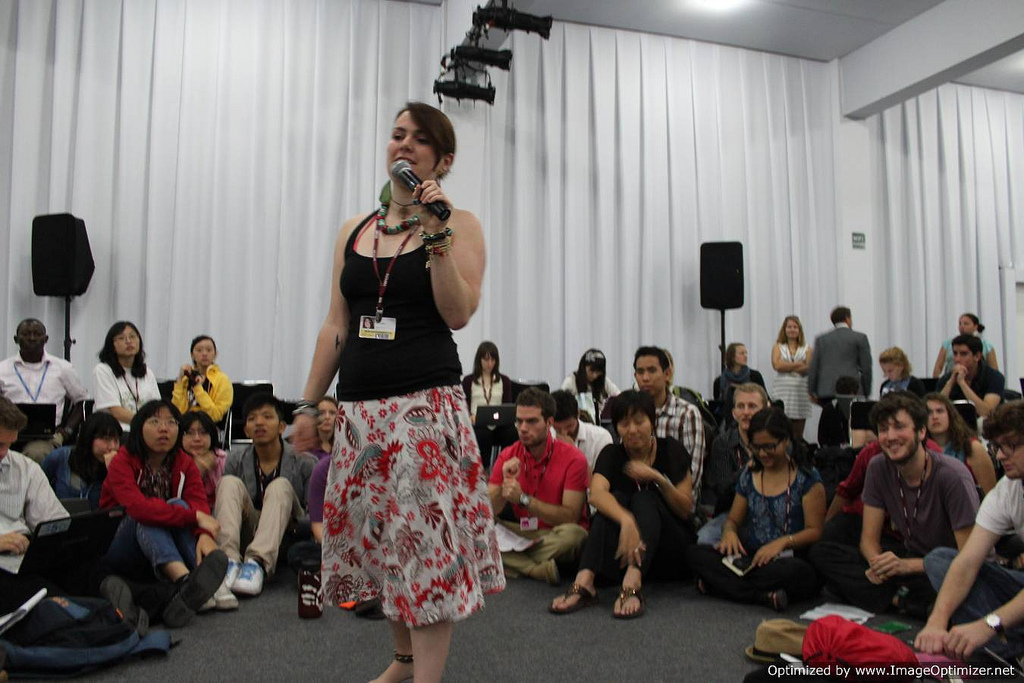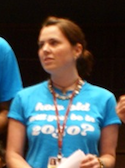Cancun week one round-up
Posted on 06. Dec, 2010 by annac in United Kingdom | View Comments
Another Monday morning, another early start, another week of negotiations beginning here at the un climate talks in Cancun. With just 2 days of negotiations followed by 3 days of ministerial meetings left we thought now would be a good time to take a step back and see where we are up to and what we have left to achieve at these talks.
But then the Guardian beat us to it! Neatly summarising where we’ve made it to on many of the key issues and what we may see happen this week.
Of course, here at Adopt a Negotiator, we don’t just like to give you the news, we like to really help you understand it. So with this in mind our UK tracker is going to give a bash at translating some of the policy wonkery for you, and fill you in on where the talks are, in her own unique way.
SO…
Policy wonk issue 1
THE GIGATONNE GAP (you have to always say it in a loud Hollywood style voice)
This is the gap between emission reductions needed to keep temperature rise below 2 degrees and emission reductions pledged under the Copenhagen accord. We did not come to Cancun expecting countries to increase their pledges but what we did need to see is a plan laid out for how they can increase their emission reduction targets (yes, that’s a process, to decide on a process, for a process…). We haven’t seen this yet. There’s still time, but this is one of the most contentious issues and we’re cautiously optimistic at best.
Policy Wonk issue 2
Forests
Protection of the worlds forests, and as such emission reductions achieved through protecting the carbon stored in them, is dealt with under the negotiations titled Reducing Emissions from Deforestation and Degradation Plus (REDD+). Last year in Copenhagen these negotiations actually got to a good place, however could not be signed off as Copenhagen descended into chaos. This year efforts to get money flowing for forest protection and advance the negotiations have taken place outside the unfccc with a view to feeding back in. These are going ok, however some countries are holding things up and there have been issues over the participation of civil society. As we go into the next week we have a chance at an actionable outcome in the form of a ‘decision’, but we have to hope that negotiators remember what REDD is really about – our amazing and beautiful forests and the people who have called them home for thousands of years.
Policy Wonk issue 3
Forests part 2
Forests in developed countries are dealt with under a part of the process call Land use Land Use Change and Forestry (LULUCF). All year now there have been major issues with the rules by which developed countries count the carbon used in this sector, with loopholes being written into the text that allow countries to fiddle the books and not count all their emissions created. These loopholes have not been fixed so far here in Cancun, so we need to work hard over the next week to make sure they are not formalised and included in any decisions we see.
Policy Wonk issue 4
Finance
$100 billion by 2020, that’s the goal for the amount of money that needs to be pledged to help developing countries affected by climate change. This is one of the things going reasonably well and that could be achieved here in Cancun. This week we just need to make sure that this money is pledged in a fair way. There was talk last week from the EU and others of instead of this money being given in grants it would be given in loans. As one person commented at an event today on finance, “If someone crashed into your car and smashed it, would you accept a loan as a payment to get the damage fixed?” I don’t think so! So this week in Cancun we have to work on making sure that money is pledged and distributed fairly.
Policy Wonk issue 5
Technology Transfer
This section of the negotiations deals with how we make sure technology advances are shared around the world to ensure everyone has access to low carbon technology. And I am happy to report that on this front things are going well, WOOP (you have to take a moment to smile at every good thing here). Unfortunately, due to time issues it looks like this might not be fully wrapped up until 2011. Still, we have made progress here and things are looking good. Now if only we can get them to move onto looking at apparation as an alternative to flying everything would be sorted…
Policy Wonk issue 6
The Kyoto Protocol
The big one this week. The Kyoto Protocol is where big developed countries (not including the USA) have committed to reducing their emissions. The first phase runs out in 2012 and while there was a lot of hope for a second, we currently have no way forward. A second commitment period was backed by many countries, but since Japan opened the talks by announcing they would not sign up to this, things have gone backwards. This is a major issue and over the coming week. Countries need to work hard to find compromise on a way forward that allows these negotiations to continue and ALL countries to do their fair share when it comes to reducing emissions.
Policy Wonk issue 7
Verification
We humans have issues with trust it would seem (Now that’s a blog post all by itself…). But one of the big issues in these negotiations is how everyone is going to prove they have actually made the reductions they say they have, and how rich countries are going to prove they have delivered on finance. This is an especially contentious issue between America, China and India. USA and China made some progress this week. Both made signals they are willing to compromise, but what this looks like we still don’t know. In the UNFCCC, however, even signals are a good thing. If we can see this turn into positive action this week, even better. So verification (or MRV as the wonks call it) is definitely an issue to look out for, and I’m pretty sure it’s an issue we will see fireworks over at some point in the coming year.
So as we move into the second week of negotiations and head towards seeing an outcome from Cancun, I think the feel in the tracker team would be one of cautious optimism. The team has been to enough of these talks to know that saving the world does not happen in one week, especially one UNFCCC week. We also know that progress can be made. Expectations for Cancun were low and progress has been slow. But if a few things fall into place this week and negotiators and ministers continue to work in the spirit of calm compromise, which has been the tone of the week one, we may just all be able to go home for the holidays with a little bit of warmth from Cancun inside.
Some bedtime reading
Posted on 05. Dec, 2010 by annac in United Kingdom | View Comments
Saturday night, the middle weekend of COP, for the tracker team this can only mean one thing…it’s time for the NGO party. As well as being a lot of fun this can sometimes be a really good chance to have a really informal chat with a few of the negotiators, as everyone takes a moment to grab a drink, hit the dance floor and relax. But it doesn’t look like we will be seeing too many of our negotiators there this time. Because a few hours ago they were all given a bit of Saturday night bedtime reading.Unfortunately for them it was the sort of bedtime reading that would send most people to sleep by the end of the first page. Though I guess for policy wonks it was like receiving a first edition of the new Harry Potter book.
At about 2pm this afternoon, we finally got the news we had waiting for all day and if you swung by the document centre in the un you could pick up a copy of the new LCA (long term cooperative action) text. When we went it was literally hot off the press, the pages were warm in our hands as we flicked through for the first time to see what it contained.
This new text will form the basis of the negotiations for the coming week. It was needed because the text the negotiators had been working on is simply not ready. There had been rumours flying everywhere and much speculation as to what it would contain, and so everyone held their breath as it was released.
Now as much as I do enjoy policy, I’m no wonk so I certainly won’t be staying in tonight and missing the party to analyse the text in full. But as I start the evening on the balcony with a beer and flip through it, I can start to form a rough picture of how it looks.
And for once the news is good, well maybe that’s an exaggeration, but the news isn’t terrible at least.
The text seems to form a good basis for the negotiations next week and there are many options in there that we would support. The aim is now to get the parties to support them too, because of course the text also includes lots of weak options that would not lead to a good outcome here or moving forward. The text very much lays out the extremes of the options we have on the table, so now what we need to see is countries compromising, being constructive and looking for a way forward that they can all accept that falls between these extremes, though of course also falls within what science demands.
The progress we are most looking for is countries reducing their emissions. This new text does not go anywhere near addressing that, and there is no way we will see countries increase their pledges here. But over the next week, with the help of this new text, and the KP text when we get it, we really need to see countries finding a way forward with this. We need countries to work out how they will over the next year increase their ambition, how they will increase their current emission reduction targets.
If we see this then we really will have taken a step forward.
So as I sit here I raise my glass to next weeks negotiations going well. And now, on Saturday night it’s time for me to take a step back from the un, to relax, recharge and heal a little bit of my soul with some dancing.
But for the negotiators it’s time to take the text to bed, and as they drift off to sleep with the sound of the Caribbean waves lulling them to sleep, decide how they can work with this text constructively over the next week.
If they do this then they can go home from Cancun knowing that they achieved something here.
Because what they are working on is a million times bigger than Harry Potter…
Facilitating chaos
Posted on 04. Dec, 2010 by annac in United Kingdom | View Comments
Something’s happened, something very strange. And, well, it’s a bit embarrassing.
I think my love of Christiana Figueres may have got out of hand…
After a week here at cop I have turned in to some kind of facilitation/process obsessive. This is (basically) the job Christiana plays here, facilitating the unfccc process to try and make things run smoothly, fairly and help countries reach consensus.
And now I’m at it too (although on a much smaller scale). I think I’m trying to be her!
As well as tracking at these talks I also work together with other young people from all around the world who are here making sure we have a say in these negotiations. This year I have been involved in the facilitation of our morning meetings. Like the unfccc we use a consensus based model for decision making and this means we have to make sure we use the right process to come to these decisions. Facilitating meetings like this really opens your eyes to how hard it is to do, and makes me very grateful that the unfccc can come to any decisions at all!
One of the most important things you do when facilitating a meeting like this is to make sure that everyone knows what’s going to happen - the order of the process, how things will work. Then they will hopefully follow what’s going on better, and a decision will be easier to come to. Now I know we’re not in a meeting, and that really this is Christiana’s job, but I thought it might also be good to try and explain to you the order things are happening here, so you too might be able to understand and follow what is going on.
So we have two weeks of negotiations here in Cancun, and we are nearly half way through. On the first day they opened, as all unfccc negotiations do, with plenaries, where everyone just made statements about their positions. The next thing they then do is a lot of process, they must adopt the agenda of the meeting and decide how they are going to work. Here in Cancun that took 4 days…. 4 days of only 2 weeks of negotiations! The reason it took so long was because they went off on a tangent about whether they were going to continue to use a consensus model, or switch to a voting method of working. 4 days later they decided to stick with consensus, and I’m not even going to begin to go into a rant about this little diversion.
Luckily they didn’t delay all other negotiations while they did this and on Tuesday parallel to those discussions contact groups started. Now contact groups are where the negotiators break down into smaller groups to try and find some ways forward in specific areas of the negotiations. Basically it’s like taking a friend you disagree with out for a coffee to try and patch up the friendship and move forward. Until it’s happened you can’t hang out with your whole friendship group because there will be tension.
Yesterday (Thursday) the negotiators got down to actually drafting text, to actually working on the document that will one day form the outcome of these talks. This means we are back to line by line negotiating, over commas, syntax and wording. What a nightmare.
But because it took them so long to get to the drafting stage we have another unfccc classic situation on our hands. Because guess what folks…
Yep, they have run out of time.
Yes we do have a whole week left, but this is not like other meetings, though we have a week left the process has to move to the next stage. On Sunday the ministers arrive and for the next week it is them, not the negotiators who will be leading the process. For Monday and Tuesday this will be lower key, a sort of bridging couple of days where they will work with the negotiators. Then on Wednesday we will enter the high level segment properly. Then it will be time for the process to be set aside and the real politics to start. This should lead to the ministers signing off on decisions on Friday night.
Well that’s how it’s supposed to go, but as I said, we have a un classic on our hands and the text isn’t ready.
So what happens now?
Well, just like at a youth meeting when we have been talking for hours and no decision has been made, this is where the facilitators step in. This time it is not Christiana but another of the facilitators in the form of Mexico, as the hosts of this COP. They have been working to try and find a way forward with the process that allows us to actually get somewhere, and soon we should be seeing the fruit of this labour in the form of a new text. Unlike in Copenhagen when the Danes produced a text that they had only consulted a few parties on, the Mexicans have been working hard to consult with all parties. But even still, whether this text will make parties happy we will only see when it appears on either Saturday or Sunday.
All I can say as we wait for it though, is I’m glad I’m not going to be the facilitator when it’s first brought to the table…
Good luck Christiana!
Negotiator Tracker - Anna Collins
Anna Collins was born and bred in Warrington in the *sunny* North of England, Anna was brought up by parents with a deep sense of justice and taught to always fight for what she believed is right.
"I guess you could say it was in the blood, my gran went to Greenham Common in the 80s" ... read more»








